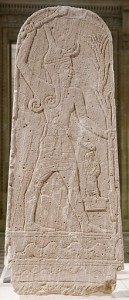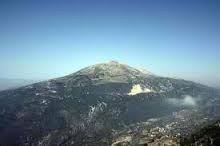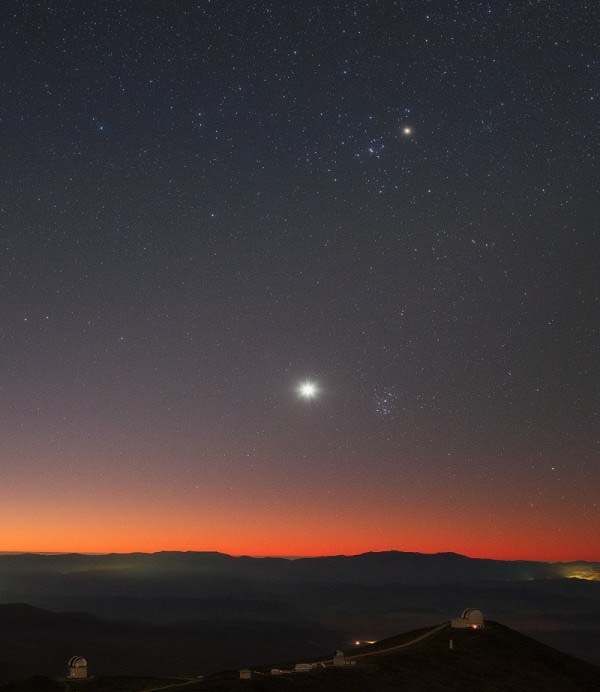In the early days of Internet for the masses I wrote a website for my church at the time, including transcripts of sermon series. One day I discovered Google Translate, and thought what fun it would be to see my sermon on Job in French. The algorithm, bless its heart, translated “Job” as “métier” throughout. That’s irrelevant to this continuation of the series on the Bible’s treatment of Genesis 1, but a bit of humour helps get the Job done.
 I’ve already commented on Elihu’s speech in ch37, with its clear reference not only to clouds as the waters above the heavens, but to a surprising understanding of the hydrological cycle. I also argued that the reference to the heavens being like a bronze mirror is about a particular middle-eastern weather pattern, not the creation of a solid firmament. The connections to Genesis 1 are somewhat limited in that passage.
I’ve already commented on Elihu’s speech in ch37, with its clear reference not only to clouds as the waters above the heavens, but to a surprising understanding of the hydrological cycle. I also argued that the reference to the heavens being like a bronze mirror is about a particular middle-eastern weather pattern, not the creation of a solid firmament. The connections to Genesis 1 are somewhat limited in that passage.
I notice the same “sitting loose” to Genesis in the theophany of Job 38, compared to the passages in Psalms or Proverbs. In order to suggest possible reasons for this, I’ll turn first to another “Creation” passage, in Job’s own speech of ch26.
 In this passage Job says some odd things that on close examination appear derived from Canaanite myths of the Baal Cycle. Most obvious is v12ff, describing God’s cutting Rahab the sea monster in pieces and piercing the gliding serpent. Although liberal scholars have seen this myth alluded to in the division of the waters in Genesis 1 (via the slaying of Tiamat in the Babylonian Enuma Elish), there really is no literary connection there, as the assyriologist Wilfred Lambert demonstrated.
In this passage Job says some odd things that on close examination appear derived from Canaanite myths of the Baal Cycle. Most obvious is v12ff, describing God’s cutting Rahab the sea monster in pieces and piercing the gliding serpent. Although liberal scholars have seen this myth alluded to in the division of the waters in Genesis 1 (via the slaying of Tiamat in the Babylonian Enuma Elish), there really is no literary connection there, as the assyriologist Wilfred Lambert demonstrated.
The sea-monster Rahab is certainly also referred to in Psalm 89, but there (and elsewhere) the story is applied figuratively to the parting of the Red Sea and the defeat of Egypt, pejoratively nicknamed “Rahab”. So the tale was known in Israel, but why should Job apply it to creation?
The plot thickens when NIV’s cryptic “he stretches out the north over empty space” (26.7) is realised to refer to Mount Zaphon, the site of Baal’s palace in the myth (or in other ANE cults the home of all the gods), being spread above the world’s tohu (the word in Gen 1.2 meaning “disorder” rather than “non-existence”).
Incidentally, I suggest that the next clause, “he hangs the earth without anything”, also originally had some now lost mythological referent, because it fits no candidate “cosmology”, be it the Genesis creation (in which the earth is the basal foundation), the Victorian “goldfish-bowl” ANE cosmology (in which the earth floats in water) or the modern cosmology, in which the earth orbits the sun in the Einsteinian space-time continuum. The world does not, in any of those views, “hang from nothing”. Tempting as it is, we must avoid that kind of pseudo-scientific accommodation, especially when it’s only superficially like the modern view.
Why would Job cite such myths so freely? Although nearly everything written about the origin of the book is speculation, I can suggest a few possible reasons. Firstly, as wisdom literature, Job has a cosmopolitan purpose and quite possibly cosmopolitan origins, just as the Book of Proverbs freely uses material from the surrounding nations. It would have suited the genre for at least the core of the book to have originated in a non-Israelite source.
Secondly, such a foreign source is asserted in the book itself, Job being from “the land of Uz”, believed by scholars to be either in Edom or somewhere north of Israel. The final composition of Job is clearly Hebrew and Yahwist, but the original story may have been an “import”; or perhaps familiar foreign elements were deliberately introduced in the way that, say, that most Puritan of poets Milton, filled his work with classical mythological references.
 Finally, Job may well (according to some scholars) have been produced in the northern kingdom of the divided Israelite monarchy as early as the 8th century, in which case Samaria’s eclectic theology might at that time have incorporated viewing Zaphon as the seat of Yahweh and his angelic council instead of that of Baal or the pagan pantheon (it appears to be such in one passage in Isaiah, ch14:13). This would be no more odd than the second temple Jewish apocalypses adopting the idea of a hierarchically-layered heaven from the Greeks, or come to that the New Testament using the Greek concept of “Hades” for Hebrew Sheol.
Finally, Job may well (according to some scholars) have been produced in the northern kingdom of the divided Israelite monarchy as early as the 8th century, in which case Samaria’s eclectic theology might at that time have incorporated viewing Zaphon as the seat of Yahweh and his angelic council instead of that of Baal or the pagan pantheon (it appears to be such in one passage in Isaiah, ch14:13). This would be no more odd than the second temple Jewish apocalypses adopting the idea of a hierarchically-layered heaven from the Greeks, or come to that the New Testament using the Greek concept of “Hades” for Hebrew Sheol.
The myth of Rahab too may have been popular in the northern kingdom in its own right as a mythical description of Yahweh’s subduing of disorder.
All this might also help explain why Job 38 is rather different from Genesis. But that’s not a disadvantage: rather it could be useful by pointing to the general worldview in that region of the ANE which informed Israel’s understanding of the physical world, which is all I’m attempting in this series of posts.
38.4-8 broadly echo Genesis in the creation of the earth (eretz) and Ps 104 in giving it solid foundations. The singing of the morning stars and the joy of the sons of God is a wonderful addition to emphasise love and goodness as the source of creation. Also interesting in this section is the fact that Job (like the rest of mankind then) is ignorant of what the earth’s foundations were laid upon. That shows the question was one that had been considered by Hebrews, but also shows that any belief projected on them – such as that they believed the earth stood in a cosmic ocean – is wrong. At the time of Job’s composition, at least, men were content to remain agnostic about it and leave it to God.
 Vv8-11 are reminiscent of the Genesis Day 3 events, with the sea (yam – this is not the primordial water but the named, and so functional, sea) being confined to its proper place. Exactly what is signified by its previously “bursting forth from the womb” is unclear: if it does not refer to some lost myth (“Yam” as a god was an opponent of Baal, an ally of El and a chum of Rahab in Cananaanite myth) it may simply represent the seas as being brought forth by God as an unruly element to be tamed. There is certainly no more mention here, than elsewhere in the Bible, of a cosmic ocean as its origin, or as a persisting entity.
Vv8-11 are reminiscent of the Genesis Day 3 events, with the sea (yam – this is not the primordial water but the named, and so functional, sea) being confined to its proper place. Exactly what is signified by its previously “bursting forth from the womb” is unclear: if it does not refer to some lost myth (“Yam” as a god was an opponent of Baal, an ally of El and a chum of Rahab in Cananaanite myth) it may simply represent the seas as being brought forth by God as an unruly element to be tamed. There is certainly no more mention here, than elsewhere in the Bible, of a cosmic ocean as its origin, or as a persisting entity.
The earth’s topology being stamped like clay under a seal-stone (v14) is another novel poetic image. It’s clearly not to be taken literally, but as a sign of God’s sovereign will over the world.
In V16 – “springs of the sea [yam]” is paralleled with “recesses of the deep [tehom], and then the poem goes on to talk about Sheol. These are all simply “down” in the sea or under the earth’s surface phenomenologically, and can’t be taken to entail connection to some cosmic body of water.
Passing upwards through the “breadth of the earth”, Job’s ignorance of which suggests that the Hebrews were as non-committal about the size and shape of the world as they were about what lay under its foundations, God goes on in vv19ff to talk about the heavens. There is a long passage about the origin of rain/snow etc, and also stars. For our purpose we should note in V34 how “clouds” are paralleled with “a flood of water”, and in v37 how clouds are paralleled with “water jars of heaven” which God, poetically speaking, tips over to make rain.
 Once more, though there is plentiful reference to water in heaven in clouds, jars, storehouses and so on, there is no mention at all of a boundless deep. This, surely, in conjunction with chs 26 and 37, should render beyond any reasonable doubt that, in the Job worldview, the waters which make rains, snow, dew and frost are in the clouds, and not in some vast ocean above a solid firmament.
Once more, though there is plentiful reference to water in heaven in clouds, jars, storehouses and so on, there is no mention at all of a boundless deep. This, surely, in conjunction with chs 26 and 37, should render beyond any reasonable doubt that, in the Job worldview, the waters which make rains, snow, dew and frost are in the clouds, and not in some vast ocean above a solid firmament.
Instead, above the clouds are the constellations (vv31-33) which govern the seasons and beautify the heavens according to the rule given them by God. These include “mazzaroth”, which in some way signifies the zodiac with its astronomical/astrological significance, and so may well mean the planets. Certainly we know from Babylonian sources that the planets were known to have “seasons” different from the background of stars: they were decidedly not merely stationary lights hung on the firmament – though neither were they likely to be thought of as physical objects.
That completes my survey of the biblical passages echoing Genesis 1. I think it confirms my phenomenological understanding of the latter, and does absolutely nothing to corroborate the “goldfish-bowl” cosmos beloved of so many nowadays. But you don’t need to corroborate things when everybody who matters knows they’re true anyway!


Another insightful post, Jon–I’ve heard that Job is one of, if not the, oldest books in the Bible. I don’t know how verifiable that is, but it would make sense as to why it’s differs from Genesis in details. Per our most recent conversation, the earlier it is, the more we might expect it to have those pagan traces (El, Baal cycle). I’m not sure how much water these thoughts hold, though. Just musings!
I was bored yesterday and looked up the Wikipedia page for “Yahweh”, and its interesting how the article discusses the concept. The editor(s) treat Yahweh seemingly as a deity not worshipped today, but only confined to his ancient setting. There is a separate page for the “Jewish conception of God”–sort of like “we’re going to talk about this god in a very sterile, historical manor over here in this article, and then we’re going to have a separate article that’s more philosophical and conceptual”. Not sure what that means (probably not much), but it struck me as interesting.
Mildly related, what’s your familiarity with Kitchen’s On the Reliability of the Old Testament? A quick search of the site brings up one article from a couple years ago (2015 was a couple of years ago?!) where you mention him–is the book worth getting/checking out from the library?
Noah
My commentary says estimates of Job’s writing vary from Solomon’s time to the second temple period. As usual too much is deduced from too little evidence, and especially on projections about what theology was (or wasn’t) around in early times according to history of religion theories.
In itself it doesn’t matter, but obviously has some bearing on side-issues like my question of ANE “cosmology”. Although some of the “Goldfish bowl” proponents seem to assume that people like St Paul would have read Genesis from a flat earth perspective, as if cosmology by then would not have been thoroughly hellenized even in Judaea, let alone in Tarsus.
I suppose Wikipedia’s marginalisation depends on the late Jewish taboo on the divine name. I guess most readers will know that the Massoretes put the vowel points for adonai (Lord) over the Tetragrammaton and it was read as “Lord”, a practice which of course predominates in the Greek NT.
But the famous coining of the word “Jehovah” from the Massoretic text surely proves that educated Christians were always well aware that they were worshipping Yahweh as ther Father, or as the Trinity.
Kitchen is good – he’s a “maximalist” on the OT historicity spectrum, but a supremely well-qualified one. It’s definitely worth reading, though even just 11 years after publication misses some new discoveries, mostly discountenancing the minimalists.
For example, as I remember he was fighting against a skeptical academy regarding the Tel Dan inscription (mentioning “House of David” – it was widely regarded as saying something else), whereas I believe the case is more or less won now, so skeptical scholars are reduced to saying that the dynasty was named after a fictional king – going against all ANE practice.
it was widely regarded as saying something else), whereas I believe the case is more or less won now, so skeptical scholars are reduced to saying that the dynasty was named after a fictional king – going against all ANE practice.
Interesting thought here. I read a comment on Biologos yesterday (I think it was George Brooks) mentioning that the accounts of the Patriarchs were modeled after the Sumerian kings–with an aside that said something along the lines of “which of course are basically all fictional”. I know next-to-nothing about the topic, and the commenter is very much a minimalist (if that’s even a small enough descriptor!), but given your comments on the exaggerated ages of the Patriarchs and other characters in Genesis I drew some kind of connection. Is there a difference between the Sumerian Kings list and the ANE practice you’re discussing, or is it not so settled that the Sumerian Kings were mostly fictional? If they are, I wonder if that should have much bearing on how we read about the Patriarchs and other such figures from early Genesis.
I know the commenter in question seems to revel in giving the ancient Israelites as little originality and autonomy in forming their beliefs as possible, so I wanted to weigh some more opinions.
Thanks as always for fielding my litany of questions; one of these days I’ll add something original to the discussion!
Noah
I struggle to comprehend George’s overall position (apart from his admitted Unitarianism), but that’s partly because he picks up most of his information from Wikipedia (using it recently, for example, to challenge the historical knowledge of Ted Davis, the professional historian, and then accusing him of generating more heat than light!).
The situation is that there is a superficial resemblance between the first antediluvian genealogy of early Genesis – not the patriarchs – and the Sumerian king list. The same number of generations, extreme longevity – and, I suppose, association with other ancient parallel stories such as Adam (like Adapa) and Noah (like Atrahasis).
But it’s questionable to draw a conclusion of dependence when (a) the biblical figures have no mention of kingship (b) the ages/regnal durations are orders of magnitude different (c) there is no connection whatsoever between the names in the lists (d) the non-genealogical details are unrelated (eg the translation of Enoch, etc).
The most one might say is that the writer of Genesis might have got the idea of a primaeval genealogy from the Sumerian pattern. But then you have to ask why such a list would be in circulation outside the royal archives where they were dug up at all: storytellers still spin yarns about Alexander the Great in Iran, I believe – but there’s not much call for reciting his family tree!
As for the Sumerians, there is no way of telling that their existence is not based on historical truth (noting their association with the hegemony of particular known city states). If I myself cite Wikipedia, the most one can say is : “names before Etana do not appear in any other known source, and their existence is archaeologically unverified.
And that is a trivial fact when one considers that if they lived, they lived at or before the origin of writing, and would necessarily have no more record than we have of any other prehistoric kings (eg all the British rulers for 9000 years before the Roman invasion). Their cities have certainly been excavated.
Wiki also says: “Although the primal kings are historically unattested, that does not preclude their possible correspondence with historical rulers who were later mythicized.” In other words, we dunno – and ignorance is not evidence.
Another factoid useful in many conversations (but don’t quote me on the exact figure) comes, if I remember, from Kitchen – and that is that we have no corroborative record for 60% of ANE rulers mentioned in all historical sources, not just the Bible. We’re talking here about the relatively late second/first millennia, when every ANE nation had writing and monumental inscriptions – but the fact is, archaeology recovers only the dregs of the past. The rest is destroyed.
Thanks for the response, Jon, and sorry for my delayed comment here–I’ve been busy the last several days!
Everything you’ve said makes a lot more sense–and it’s good to be reminded that we are dealing with very, very ancient history. I’ve been thinking that keeping these things in mind may be helpful when reading the accounts in Genesis and, to a lesser extent, Exodus. Either way, Moses (and the later compilers/editors) were talking about something they decidedly were not around for, so the key is to look for the truth in the story and not sweat the stuff that perhaps feels “off” (of course, this is a slippery slope to Enns/Sparks errantism, but I trust myself!). Any thoughts on that?
Also, wildly unrelated–I stumbled across an [article](https://phys.org/news/2017-01-reveals-substantial-evidence-holographic-universe.html) talking about the evidence for a holographic universe. What are your thoughts on it? My main concern is theological/existential–it feels like they’re asserting our entire existence is an illusion or something. But perhaps I’m just being sensitive–the socio-political climate over here has me on edge!
Thanks again Jon!
Well, it seems I don’t know how to hyperlink properly…
Hmm – I’m sure there used to be a list of codes in the editor. But I upgraded the WordPress version today, so it’s probably progress to leave them out!
Noah
Second point first – they haven’t defined “reality”, let alone “illusion”. Currently we already know that our perceived reality is a biological system of interpretation of particles, energy, fields and so on that we can’t actually know first-hand. So if God creates our reality that way, that’s what it is.
OK, so if behind that all particles, energy and fields are actually created at a flat boundary to the universe, then all it means is that another layer has been added to the causation of our reality. So that’s how God did it… but reality is still reality – we always knew there was some strange relationship between ideas in God’s mind and their “existence” (as we call it in our reality).
So the fact that the hologram idea is probably tosh makes no difference to the fact we live to serve this reality under God, however it came to be.
On the first point, Kenton Sparks and Peter Enns have privileged information about the distant past not granted to us mortals, so don’t question them.
But positively, one of the wonders of the Bible is its fundamental applicability to whatever society it’s read in. So (as hinted in the OP) taking Genesis 1 historically, though probably not the author’s intention, did no spiritual harm to the generations of Christians who took it for granted. By God’s providence, the doubts raised by deep time have more or less coincided with the answers provided by ANE studies.
If we leave to one side what we don’t understand, rather than declaring it error, we may well be pleasantly surprised in time and will save a multitude of worse mistakes.